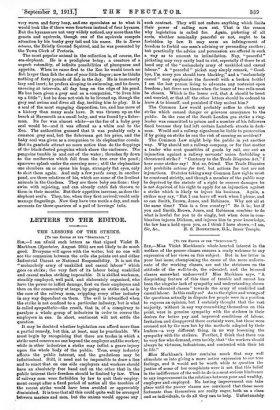LETTERS TO THE EDITOR.
THE LESSONS OF THE STRIKE.
[To THY EDITOR OP TEl "SPECTATOR...]
am afraid such letters as that signed Violet R. Markham (Spectator, August 26th) are not likely to do much good. Everyone will agree with the writer, but no one will , see the connexion between the evils she points out and either [Industrial Unrest or National Responsibility. It is not the "melancholy army of unskilled and casual labour" which goes on strike ; the very fact of its labour being unskilled and casual makes striking impossible. It is skilled workmen, steadily employed, well paid, and elaborately organized, who have the power to inflict damage, first on their employers and then on the community at large, by going on strike and, as in the case of the railway men, crippling every other industry in any way dependent on them. The evil is intensified when the strike is not confined to a particular industry, but is what is called sympathetic—the result, that is, of a conspiracy to paralyse a whole group of industries in order to coerce the employers in one. In short, sentiment will not settle the question.
It may be doubted whether legislation can afford more than a partial remedy, but this, at least, may be practicable. We must begin by recognizing that there are trades in which a strike need concern no one beyond the employer and the worker; while in other industries a strike may inflict a grave injury upon the whole body of the public. True, every industry affects the public interest, and the gradations may be infinitesimal. Still, it need not be impossible to draw a line and to exact that on one side employers and workers should have an absolutely free hand and on the other that in the public interest their freedom should be limited by law. Thus if railway men were forbidden by law to quit their employ- ment except after a fixed period of notice all the troubles of the recent strike would have been avoided or appreciably diminished. It is true that all this could quite well be arranged between masters and men, but the unions would oppose any
such contract. They will not endure anything which limits their power of calling men out. That is the reason why legislation is called for. Again, picketing of all sorts, whether nominally peaceful or not, ought to be forbidden by law. It may seem an infringement of freedom to forbid one man's advising or persuading another ; but practically the advice and persuasion are offered in such a way as to amount to intimidation. Nay, " peaceful " picketing may very easily lead to riot, especially if there be at hand any of the " melancholy army of unskilled and casual labour." A " peaceful" picket may simply remark, " Good- bye, I'm sorry you should turn blackleg," and a "melancholy casual" may emphasize the farewell with a broken bottle! I am the last person living to advocate any restraint upon freedom ; but there are times when the lesser of two evils must be chosen. Which is the lesser evil, that A should be beset and worried, or that all the other letters should be ordered to leave A to himself, and punished if they molest him P
The Common Law would probably suffice to cheek any strike which caused danger or grievous annoyance to the public. In the case of the South London gas strike a ring- leader was committed to prison and a number of his followers fined because they had left certain Lambeth streets in dark- ness. Would not a railway signalman be liable to prosecution if by going on strike he ran the risk of causing an accident P The Common Law might help the public in yet another way. Why should not a railway company, or for that matter a trader who sent quantities of goods by rail, sue out an injunction against a railway servants' union forbidding a threatened strike P " Contrary to the Trade Disputes Act," I hear some striker say! Not so, friend. The Trade Disputes Act prohibits actions for tort, but actions for tort are not injunctions. Statutes taking away Common Law rights must be construed strictly, and though a member of the public may be deprived by the statute of a right to recover damages he is not deprived of his right to apply for an injunction against a strike which is likely to injure his business. Again, a striker may say, " But I can leave off work when I please, and so can Smith, Brown, Jones, and Robinson. Why not all at the same time P This is a free country!" So it is ; but if you and Smith, Brown, Jones, and Robinson combine to do what is lawful for you to do singly, but when done in com- bination injures Dickson, and injures him to your knowledge, the law has a hold upon you, as I think I have shown.—I am, Sir, &c., E. S. ROBERTSON, B.L., Inner Temple.






































 Previous page
Previous page